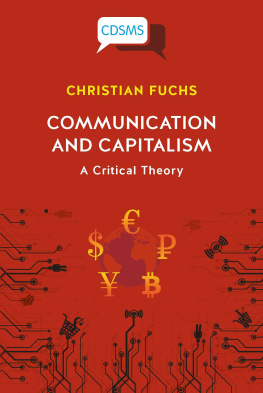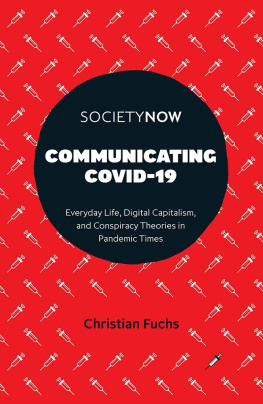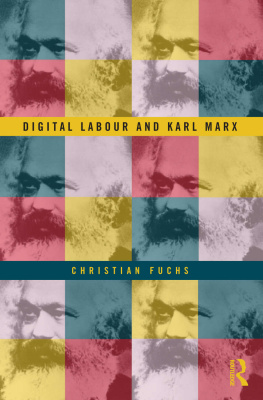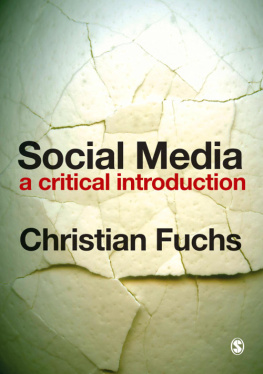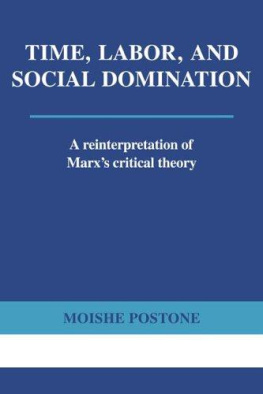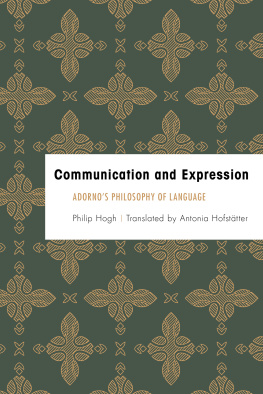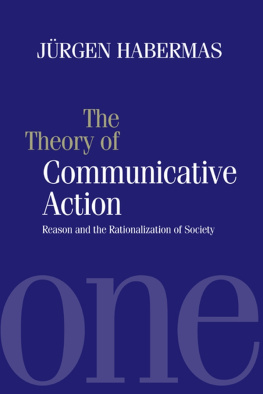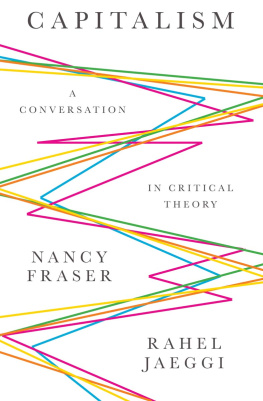Contents
Communication and Capitalism:
A Critical Theory
Christian Fuchs
Critical, Digital and Social Media Studies
Series Editor: Christian Fuchs
The peer-reviewed book series edited by Christian Fuchs publishes books that critically study the role of the internet and digital and social media in society. Titles analyse how power structures, digital capitalism, ideology and social struggles shape and are shaped by digital and social media. They use and develop critical theory discussing the political relevance and implications of studied topics. The series is a theoretical forum for internet and social media research for books using methods and theories that challenge digital positivism; it also seeks to explore digital media ethics grounded in critical social theories and philosophy.
Editorial Board
Thomas Allmer, Mark Andrejevic, Miriyam Aouragh, Charles Brown, Melanie Dulong de Rosnay, Eran Fisher, Peter Goodwin, Jonathan Hardy, Kylie Jarrett, Anastasia Kavada, Arwid Lund, Maria Michalis, Stefania Milan, Vincent Mosco, Safiya Noble, Jack Qiu, Jernej Amon Prodnik, Sarah Roberts, Marisol Sandoval, Sebastian Sevignani, Pieter Verdegem, Bingqing Xia, Mariano Zukerfeld
Published
Critical Theory of Communication: New Readings of Lukcs, Adorno, Marcuse, Honneth and Habermas in the Age of the Internet
Christian Fuchs
https://doi.org/10.16997/book1
Knowledge in the Age of Digital Capitalism: An Introduction to Cognitive Materialism
Mariano Zukerfeld
https://doi.org/10.16997/book3
Politicizing Digital Space: Theory, the Internet, and Renewing Democracy
Trevor Garrison Smith
https://doi.org/10.16997/book5
Capital, State, Empire: The New American Way of Digital Warfare
Scott Timcke
https://doi.org/10.16997/book6
The Spectacle 2.0: Reading Debord in the Context of Digital Capitalism
Edited by Marco Briziarelli and Emiliana Armano
https://doi.org/10.16997/book11
The Big Data Agenda: Data Ethics and Critical Data Studies
Annika Richterich
https://doi.org/10.16997/book14
Social Capital Online: Alienation and Accumulation
Kane X. Faucher
https://doi.org/10.16997/book16
The Propaganda Model Today: Filtering Perception and Awareness
Edited by Joan Pedro-Caraana, Daniel Broudy and Jeffery Klaehn
https://doi.org/10.16997/book27
Critical Theory and Authoritarian Populism
Edited by Jeremiah Morelock
https://doi.org/10.16997/book30
Peer to Peer: The Commons Manifesto
Michel Bauwens, Vasilis Kostakis, and Alex Pazaitis
https://doi.org/10.16997/book33
Bubbles and Machines: Gender, Information and Financial Crises
Micky Lee
https://doi.org/10.16997/book3
Cultural Crowdfunding: Platform Capitalism, Labour, and Globalization
Edited by Vincent Rouz
https://doi.org/10.16997/book38
The Condition of Digitality: A Post-Modern Marxism for the Practice of Digital Life
Robert Hassan
https://doi.org/10.16997/book44
Incorporating the Digital Commons: Corporate Involvement in Free and Open Source Software
Benjamin J. Birkinbine
https://doi.org/10.16997/book39
The Internet Myth: From the Internet Imaginary to Network Ideologies
Paolo Bory
https://doi.org/10.16997/book48
Communication and Capitalism:
A Critical Theory
Christian Fuchs

University of Westminster Press
www.uwestminsterpress.co.uk
Published by
University of Westminster Press
115 New Cavendish Street
London W1W 6UW
www.uwestminsterpress.co.uk
Text Christian Fuchs 2020
First published 2020
Cover design: www.ketchup-productions.co.uk
Series cover concept: Mina Bach (minabach.co.uk)
Print and digital versions typeset by Siliconchips Services Ltd.
ISBN (Paperback): 978-1-912656-71-4
ISBN (PDF): 978-1-912656-72-1
ISBN (EPUB): 978-1-912656-73-8
ISBN (Kindle): 978-912656-74-5
DOI: https://doi.org/10.16997/book45
This work is licensed under the Creative Commons
Attribution-NonCommercial-NoDerivatives 4.0 International License. To view a copy of this license, visit http://creativecommons.org/licenses/by-nc-nd/4.0/ or send a letter to Creative Commons, 444 Castro Street, Suite 900, Mountain View, California, 94041, USA. This license allows for copying and distributing the work, providing author attribution is clearly stated, that you are not using the material for commercial purposes, and that modified versions are not distributed.
The full text of this book has been peer-reviewed to ensure high academic standards. For full review policies, see: http://www.uwestminsterpress.co.uk/site/publish. Competing interests: The author has no competing interests to declare.
Suggested citation: Fuchs, C. 2020. Communication and
Capitalism: A Critical Theory
London: University of Westminster Press.
DOI: https://doi.org/10.16997/book45 License: CC-BY-NC-ND 4.0
To read the free, open access version of this book online, visit https://doi.org/10.16997/book45 or scan this QR code with your mobile device:

Contents
Dedication
This book is dedicated to the memory of my father Gerhard Fuchs (2 September 19489 October 2018).
Keep on rockin!
Acknowledgements
Over the years, I have had the privilege to work together with outstanding human beings, for which I am very grateful. They include: Marisol Sandoval, Thomas Allmer, Sebastian Sevignani, Wolfgang Hofkirchner, Dimitris Boucas, David Chandler, Eran Fisher, Pete Goodwin, Denise Rose Hansen, Anastasia Kavada, Manfred Knoche, Verena Kreilinger, Andrew Lockett, Arwid Lund, Maria Michalis, Lara Monticelli, Vincent Mosco, Yuqi Na, Jack Qiu, Daniel Trottier, Pieter Verdegem, Frank Welz.
Abbreviations Used in the book:
MECW: Karl Marx and Friedrich Engels. Collected Works . London: Lawrence & Wishart.
CHAPTER 1
Introduction
This book presents an introduction to the critical theory of communication. It asks:
What is communication?
What are communications roles in society?
What does it mean to study communication critically based on a materialist approach (communicative materialism)?
What are the roles of communication in capitalism?
What alternatives are there to capitalist communication?
1.1. Marxist Theory
At the time of and in the years after the student rebellions of 1968, socialist politics and radical theory were flourishing. Activists and especially young people were seeking alternative ways of life and perspectives that pointed beyond capitalism and imperialist wars. The New Left was a movement for socialism that strongly influenced politics and culture in the 1960s and 1970s. Reading and interpreting Marxs theory was back then an important part of academia and activism. Activists tried to put Marxs theory into praxis.
But the 1970s also saw a major economic crisis and as a consequence the rise of neoliberal politics that aimed at the commodification of everythingoperating under the control of neoliberal managers who have seen students as fee-paying customers yielding profits, knowledge as an instrument of capital, and academics as machines producing outputs, impacts, and grants. Under these conditions, Marxs approach was over decades presented as a failed theory and socialism as a failed model of society corresponding to Marxist theory.

